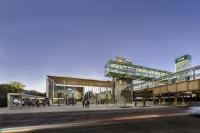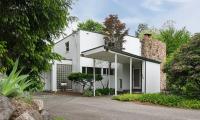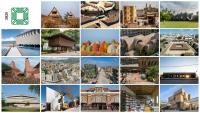Student Village, Royal Veterinary College
Hatfield, Großbritannien
Hawkins\Brown has completed new student accommodation, a restaurant and CPD facility at the Royal Veterinary College’s Hawkshead Campus near Potters Bar, Hertfordshire.
The scheme allows for an increased number of students to live on campus, providing accommodation for 205 students, a restaurant and conference/meeting rooms.
Renowned as one of the world’s leading veterinary colleges and research centres, the Royal Veterinary College operates out of two campuses; the central London Campus in Camden and the Hawkshead Campus near Potters Bar in Hertfordshire.
Hawkshead Campus is set within 6 acres of Hertfordshire greenbelt. The new low-rise development is sensitive to its rural setting maintaining views across the campus.
The 6,480 sq m development replaces Northumberland Hall, providing improved accommodation, which better suits the needs of the college’s mature student demographic.
The mass of the scheme is broken down into a collection of low-rise three and four storey pavilions arranged around courtyards of varying sizes and linked by a lightweight aluminium core. The larger space towards the centre creates a focal point and a place where all students can congregate. The pavilions are arranged in pairs and linked by a lightweight aluminium clad lift and stair core.
The public areas, including the restaurant, CPD areas and catered student accommodation are located in the south east corner of the development to connect with existing student services on the campus, including TaRC, a new building by Architecture PLB and the Eclipse building by Nicholas Hare Architects, which will become the new social hub of the campus. A new landscaping scheme by Grontmij connects unifies these buildings.
The original campus buildings were built of brick and recent additions to the campus have been timber clad. The new development references this existing palette, by combining Western Red Cedar timber cladding with Bronsgroen brick, which are affordable and low maintenance materials that will age well with the cedar weathering to a silver grey. Windows are recessed with powder coated aluminum lining to maintain the timber cladding weathering rates across the façade.
The timber cladding incorporates two different widths of board, with the gaps between each board varying also. The size of board was chosen for its efficiency once cut and planed after discussions with the sub contractor, to minimize wastage to each module. The pattern used is offset at each floor level to breakdown the massing of each pavilion.
Inside the student accommodation full height oriel windows maximise daylight in each bedroom. One floor to ceiling panel glazed at an oblique angle is combined with two night purging panels set behind a perforated panel, to provide privacy and secure night ventilation.
The oriel windows are combined with punched windows to break down the massing of the building.
The aluminum cladding to the cores is perforated with a bespoke pattern designed in collaboration with Nicky Hirst, the visual artist that Hawkins\Brown previously worked with on the award-winning New Biochemistry department at the University of Oxford. The aluminum is anodised to a light bronze finish, which has been chosen to compliment the brick and timber finishes.
Overall the finished result has exceeded expectations and demonstrates what can be achieved on a budget when good design is combined with simple high quality materials.
The project boasts many green credentials including: the provision of cycle parking; water and energy management including solar thermal arrays for domestic hot water and grey water recycling; as well as the use of sustainable materials in its construction, resulting in a BREEAM Very Good rating.










